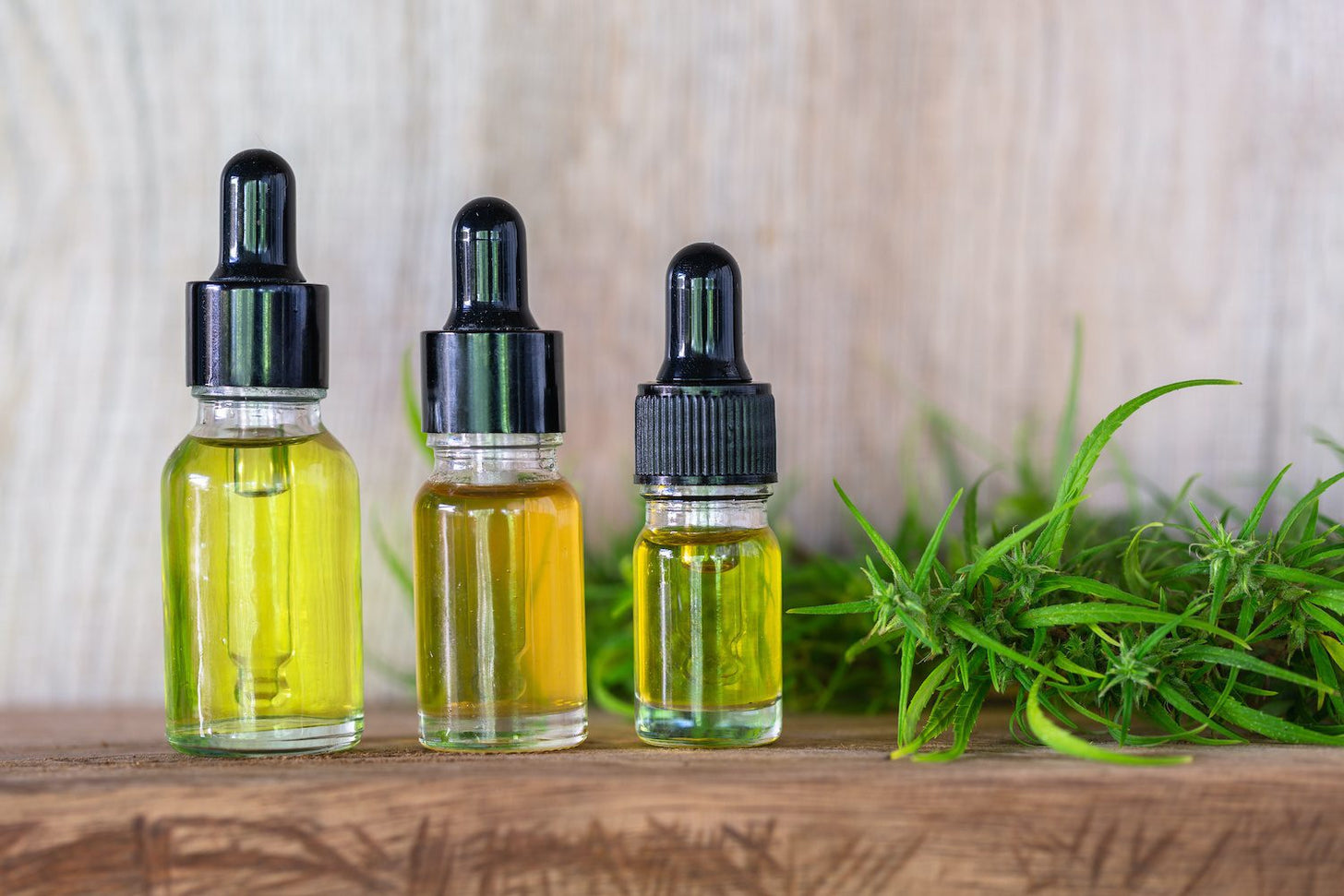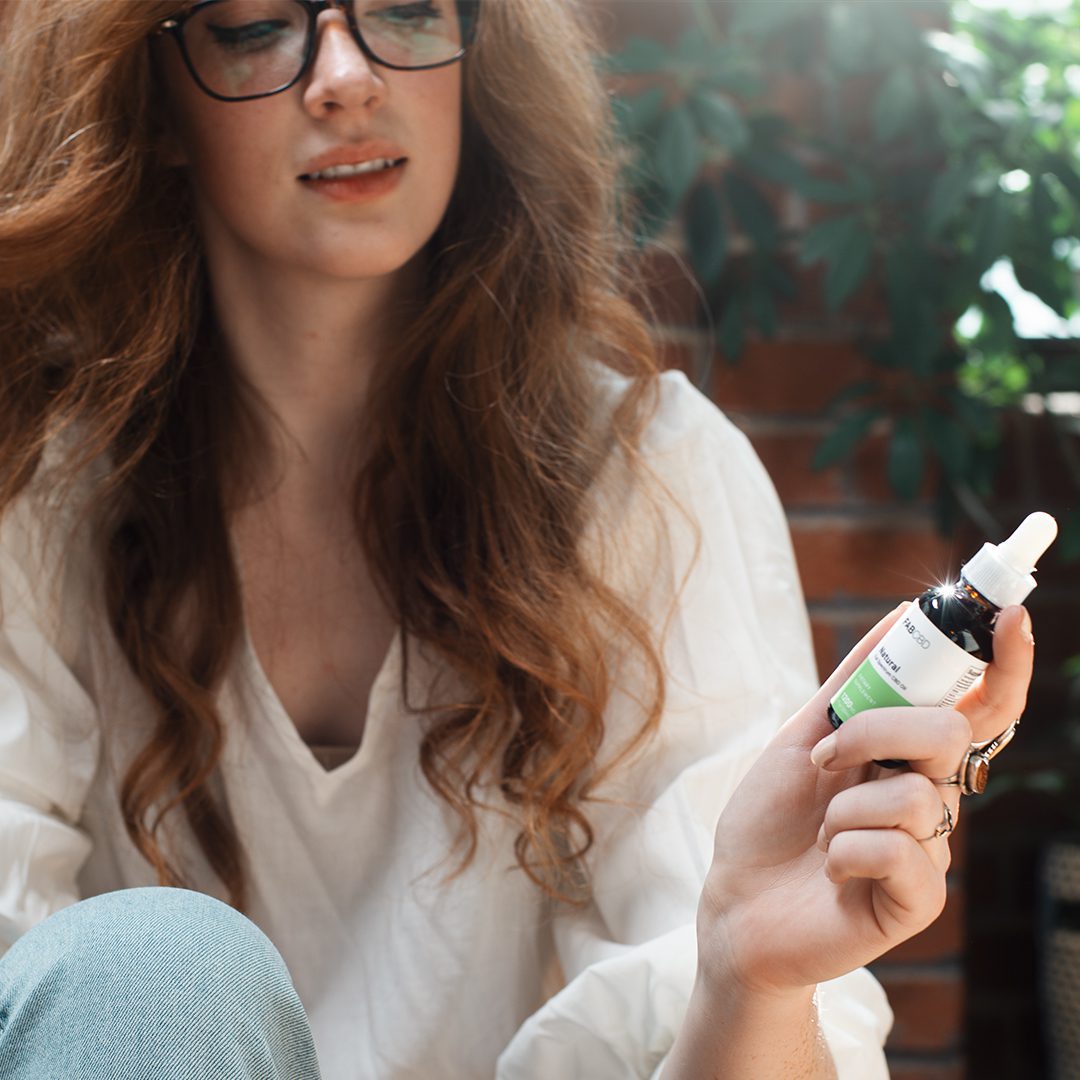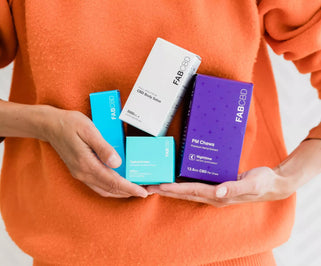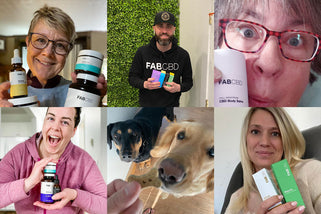
CBD Oil Dosage: How Much Should You Take?
There’s no doubt that out of all of the different types of cannabidiol-based products available on the market, CBD oil remains one of the most commonly used. CBD oil, also referred to as a “CBD tincture” or “CBD drops,” is an oil-based product that comes in a dropper bottle which is most frequently administered to the sublingual tissue under the tongue for fairly fast absorption. Because it's available in a wide range of strengths and flavors, this makes it an awesome choice for anyone who might be looking to make cannabidiol part of their daily health and wellness routine.
 Finding high-quality CBD oil is important, but that’s only half the battle. It’s crucial to come up with a daily routine that will best give you the results you desire, especially if you have a particular goal in mind when using hemp.
Finding high-quality CBD oil is important, but that’s only half the battle. It’s crucial to come up with a daily routine that will best give you the results you desire, especially if you have a particular goal in mind when using hemp.
 But that’s not the only way you can use this type of product. CBD oil can also be added to food or applied topically if needed. Keep in mind that the oil will not be as effective if it is added into food or drink. For the best and strongest effect, CBD oil should be taken directly into the body. You may have noticed that some brands also produce CBD oil products for dogs and cats. This is because mammals also have an endocannabinoid system that utilizes cannabinoids to promote wellbeing and equilibrium throughout the body. However, you should not give your pet a cannabidiol product intended for humans, as THC can be harmful to animals. Instead, look for one that’s formulated specifically for your pet’s breed and body weight.
But that’s not the only way you can use this type of product. CBD oil can also be added to food or applied topically if needed. Keep in mind that the oil will not be as effective if it is added into food or drink. For the best and strongest effect, CBD oil should be taken directly into the body. You may have noticed that some brands also produce CBD oil products for dogs and cats. This is because mammals also have an endocannabinoid system that utilizes cannabinoids to promote wellbeing and equilibrium throughout the body. However, you should not give your pet a cannabidiol product intended for humans, as THC can be harmful to animals. Instead, look for one that’s formulated specifically for your pet’s breed and body weight.
 Once you find the right strength that works best for you, then you need to find the right dose that works best for your overall health and wellness goals. When it comes to CBD oil, your body needs time to get used to both the CBD oil as well as the dosage. So, if you have opted to go with a 600mg bottle of CBD oil, begin by taking a half a dropper full once a day. This will roughly equal 10 mg of CBD a day. Stay at this dose for one week, then check in with yourself to see how you are feeling. If you feel that you need more CBD oil, increase to a half a dropper full twice a day. This will now equal 10mg twice a day, or 20 mg a day. Stay with this dose for yet another week before checking in with yourself again. Keep using this method until you’ve found the right dose for your needs.
Once you find the right strength that works best for you, then you need to find the right dose that works best for your overall health and wellness goals. When it comes to CBD oil, your body needs time to get used to both the CBD oil as well as the dosage. So, if you have opted to go with a 600mg bottle of CBD oil, begin by taking a half a dropper full once a day. This will roughly equal 10 mg of CBD a day. Stay at this dose for one week, then check in with yourself to see how you are feeling. If you feel that you need more CBD oil, increase to a half a dropper full twice a day. This will now equal 10mg twice a day, or 20 mg a day. Stay with this dose for yet another week before checking in with yourself again. Keep using this method until you’ve found the right dose for your needs.
 When you take your CBD oil after eating, it's getting diluted and broken down through the digestion process. That means if you're taking CBD oil after a big meal, then you are simply missing out on the compound's potency.
When you take your CBD oil after eating, it's getting diluted and broken down through the digestion process. That means if you're taking CBD oil after a big meal, then you are simply missing out on the compound's potency.
 As far as how fast it takes for CBD to work in the body, that depends on quite a few factors. Some of them are as follows:
As far as how fast it takes for CBD to work in the body, that depends on quite a few factors. Some of them are as follows:
 Since there is not one perfect dose that will work for everyone, it’s imperative that you check in with yourself to see how you’re feeling while you are on each new dose of CBD oil. Your body will be your best guide in letting you know if and when it’s time to increase your dose of CBD oil. As always, you can always reach out to your primary care doctor or medical specialist for help with establishing and/or increasing the dose of your CBD. Incorporating CBD oil into your healthcare regimen takes patience, time, and a little research in order to ensure that it is working optimally for you. Only then will you find the right dosage and delivery method that works best for your health and wellness needs.
Since there is not one perfect dose that will work for everyone, it’s imperative that you check in with yourself to see how you’re feeling while you are on each new dose of CBD oil. Your body will be your best guide in letting you know if and when it’s time to increase your dose of CBD oil. As always, you can always reach out to your primary care doctor or medical specialist for help with establishing and/or increasing the dose of your CBD. Incorporating CBD oil into your healthcare regimen takes patience, time, and a little research in order to ensure that it is working optimally for you. Only then will you find the right dosage and delivery method that works best for your health and wellness needs.

What is CBD?
CBD, or cannabidiol, is one of the two main cannabinoid compounds of the cannabis plant. THC, or tetrahydrocannabinol, is the second main cannabinoid of the cannabis plant, and unlike CBD, in large quantities THC produces a euphoric high. Hemp and marijuana both belong to the cannabis genus, and while marijuana will cause feelings of euphoria due to its high levels of THC, hemp is non-psychoactive and legal according to the 2018 Farm Bill. In fact, the hemp plant naturally contains low levels of THC that are at the legal limit of 0.3%. Cannabidiol has many unique properties that come from the way in which it supports the body’s endocannabinoid system that helps maintain homeostasis, or balance. This is why so many people take CBD daily for needs related to their wellness. Briefly, the endocannabinoid system helps to balance and regulate bodily functions and systems such as:- Reproduction
- Sleep
- Mood
- Appetite
- Memory
- Stress
- Motor Control
- Inflammation
- Learning and Memory
What is CBD Oil?
CBD oil is a fairly simple formula that has become extremely popular because of how easy it is to use. The cannabidiol compound is present in the flowering buds of the hemp plant, which also possess a vast array of additional cannabinoids as well as terpenes, phytonutrients, vitamins and minerals, and other compounds deemed desirable. CBD oil relies on a hemp extract, which means that the hemp flowers have been run through an extraction process to produce an oil-based concentration. Then, the extract is mixed into a carrier oil that is considered perfectly safe for human consumption such as hempseed oil, MCT (coconut) oil, or olive oil.How to Use CBD Oil
CBD oil can be used in a few different ways. The most popular way to use CBD oil is as an oral tincture. Tinctures are products that are absorbed through the sublingual tissue in the mouth. The dosage is placed under the tongue using a dropper where it is then absorbed through the tissue and into the body fairly quickly. In order for effective absorption, the oil should be held under the tongue for about one minute before being swallowed. The cannabidiol should peak within 15 to 45 minutes and can remain effective for up to four hours.
CBD Oil Types
There are three main specific types of CBD oil products that can be found on today’s market. These types are full-spectrum oils, broad spectrum oils, and CBD isolates. The differences in each are discussed in further detail below.Full-Spectrum CBD Oil
The term full-spectrum refers to the type of extract used to make the product. Full-spectrum hemp extract is an extract that has retained the full chemical composition of the hemp plant’s flowers. When hemp is extracted, the resulting concentrate naturally boasts the full chemical makeup of cannabinoids, terpenes, phytonutrients, and vitamins and minerals. Some manufacturers may isolate and remove specific compounds to alter the composition of their formula. These products are not considered to be full-spectrum CBD oils. Full-spectrum CBD oils have not had any compounds removed, which means that it does contain a trace, non-psychoactive amount of THC that naturally exists in hemp. By law, all full-spectrum products must contain less than 0.3% THC.Broad Spectrum CBD Oil
Broad spectrum CBD oil is an alternative to full-spectrum oil, as it does not contain any THC. All traces of the THC have been removed via advanced isolation and purification techniques.CBD Isolates
CBD Isolates are products that have had everything but the cannabidiol in them removed. Isolates are considered to be the purest form of CBD on the market, as they only contain 99% pure CBD and no other compounds, terpenes, or phytonutrients.Flavors and Strengths
Along with the different oil compositions, CBD tinctures can also come in an array of strengths and flavors. The flavors you choose will depend on your personal tastes, while the strengths you select will largely be dictated by your health needs and wellness goals.CBD Oil Flavors
CBD oil comes in a wide variety of flavors. Unflavored options do exist as well. Some oils are flavored by terpenes, which are natural compounds that give hemp its flavor profile. Some brands, however, use flavoring additives. In doing your research, you should only purchase oils from a brand that uses natural and organic flavorings in its CBD oils.CBD Oil Strength
CBD oil comes in a uniquely wide-array of strengths that are measured by the milligram. Every bottle should clearly state the milligram (mg) strength. This number usually reflects the total milligrams of CBD in the bottle, which can then be divided by the number of milliliters to determine how many milligrams are in each dose.What Milligram Strength is Right for You?
Well, it depends on why you’re using CBD, and what your ultimate goals are. Most people start out with a 1000mg formula because this is a standard strength for a 30ml bottle. This means that each dose contains 33 milligrams, which is not too low and not too high. Remember that CBD is nontoxic, so higher strengths should be perfectly fine. You can always consult with your primary care physician or specialist to see if they recommend a higher or lower strength. The strength of CBD oil is important to pay attention to because it has everything to do with whether or not your experience is effective. The strongest CBD oil is ideal for those with more severe issues and those with higher body weights, while lower strengths work well for those who simply want to maintain or boost their overall health and wellness.Where to Find CBD Oil Online
Now that you know what CBD oil is and how to take it, let’s talk about the best places to find the highest-quality options possible.- First, cannabidiol products are widely available online.
- You can look for a CBD distributor that offers a solid variety of high-quality products from top-rated brands, as here you’ll find the widest selection available.
- You can also opt for buying directly from a brand’s website.
- Always look for third-party lab reports, as these indicate that the brand has their hemp thoroughly tested by an unbiased, independent laboratory for quality and purity.
Where to Find a CBD Store in Your Area
You’re most likely to find CBD oil in vape shops and wellness stores. Always thoroughly research a brand before buying its CBD oil. Even though there are a multitude of brands on the market, not all of their CBD products are created equal. Indeed, some CBD oil that you come across may not have the level of quality that you need because the products may be of poor quality and lacking in purity, strength, and effectiveness. Even though it's easy and convenient to take a trip to the vape shop down the street, it might not be that easy to find all of the information on a CBD oil that you're interested in. When you purchase products online from a reputable brand like ours, you can take all the time you need to search through our products, examine independent third-party lab reports, read through verified customer reviews, and spend some time thinking about what CBD oil flavor and strength will be best for your needs. You will not be able to do this when you visit a local brick and mortar retailer. In light of this, online brands are the best way to go.CBD Oil Dosage Has More Meanings Than You Can Imagine
Overall, CBD oil is an incredibly versatile product that provides you with all of the unique properties found within cannabidiol. If you have questions or concerns about beginning a health regimen with CBD oil, feel free to talk with your doctor or specialist about how to incorporate the oil into your daily routine. You may find that the simple act of taking CBD oil every day takes your wellness regimen to the next level while helping you finally reach your goals. Figuring out the best dosage for CBD doesn’t have to be tricky or confusing. In fact, a great rule of thumb when it comes to finding the right dose is to start low and go slow. Since dosing is different for everybody, the journey to finding the right dose will look different for everyone. But what happens when you’ve found your right dose and it doesn’t seem to be working for you anymore? If that’s the case for you, then it’s time to learn when you should consider increasing your CBD dosage.Different CBD Oil Doses for Different Bodies
As stated earlier, there really isn’t one set dose that’s a perfect fit for everyone when it comes to CBD. Since everyone’s body is different, a dose that works best for one person might not work that great for another. Therefore, when it comes to finding the right dose, it’s best to take time and slowly increase as needed while carefully observing how you’re feeling and how your body is reacting to the current dose you’re on. When you are trying to find the right CBD dosage for yourself, the first thing you need to do is choose the CBD oil strength that will work best for your health goals and overall wellness needs. Typically, higher strength oils like 1200 mg and 2400 mg oils are needed to help handle tougher health issues, while middle and lower strength oils like 600 mg and 300 mg may help boost general health.
Too Much, or Too Little: Why it Matters
We all know that taking too little CBD oil can be ineffective. But did you also know that taking too much CBD oil can be just as ineffective? First, if you’re worried about overdosing on CBD oil, rest assured, you cannot overdose with the small amounts you will be taking every day within our dosing guidelines. Consuming too much CBD when you first start taking CBD oil will cause you to build up a tolerance. This, in turn, will cause you to have to take more of the oil in order to achieve the same effect over time. If you find that this is happening to you, try taking a break for a few days before beginning again at a lower dose. This is why we say to start low and go slow. When it comes to taking CBD oil, you need to start gradually so that you can eventually find that sweet spot where you will be able to receive all of the benefits that CBD has to offer. Taking too much or too little CBD will cause you to miss out.Consistency is Key
When you begin to take CBD oil, you should take it at the same time each and every day. Consistency is key when taking CBD oil because when you take the oil at the same time each day, you’re creating a more reliable testing environment so you really know if it’s the CBD that’s helping or if it’s other factors. When you take CBD oil, you should drop it under your tongue and hold it there for about 60 seconds. In doing this, you are allowing the CBD to enter into the bloodstream after it passes through the thin membrane under the tongue. As far as eating or not eating with CBD is concerned, you should take CBD oil on a relatively empty stomach.
CBD Carrier Oils Matter
Most reputable brands, such as FAB CBD, use medium-chain triglycerides in the creation of their CBD oil products because CBD binds well to these fat-rich oils, making them better metabolized through the liver. While FAB uses MCT derived from sources like Coconut Oil, there are a variety of foods that contain medium-chain triglycerides and long-chain triglycerides which help to boost the bioavailability of CBD within the body. Some of the foods that contain Medium Chain Triglycerides include:- Olive Oil
- Coconut Oil
- Sesame Oil
- Eggs
- Meat
- Fish
- Avocados
- Nuts
When Should You Change Your CBD Dosing?
The simple answer to that question is that you should change your dosage if you no longer feel the effects you desire from your CBD oil. Having said that, you should stay on your current preferred dose for a good length of time before changing your dose in order to avoid building up a tolerance too quickly. You should always be checking in with yourself to see how you are feeling as well, as that will also help you to determine whether or not you need to change your dose. If you are unsure whether you should be increasing your dosage, you can always consult with your primary care doctor or medical specialist.
- The content, quality, and potency of the CBD oil
- The method of consumption
- The dose you are taking
- Your overall health and wellness goals
- Your weight, your genetics, your overall body makeup, liver performance, immune system function, medical history, and age
Closing Thoughts on Changing Your CBD Dosage
CBD can be a wonderful and beneficial part of your everyday health regimen. As with starting any supplement or medication, your body needs time to get used to both the CBD as well as the dosage. One way to do that is to begin using a small amount of CBD oil each day and then increasing both the frequency and the dose slowly to give your body time to adjust. In doing this, you are also ensuring that your body will not build up a tolerance to the CBD too quickly, which will ultimately cause you to use more CBD over time.
















